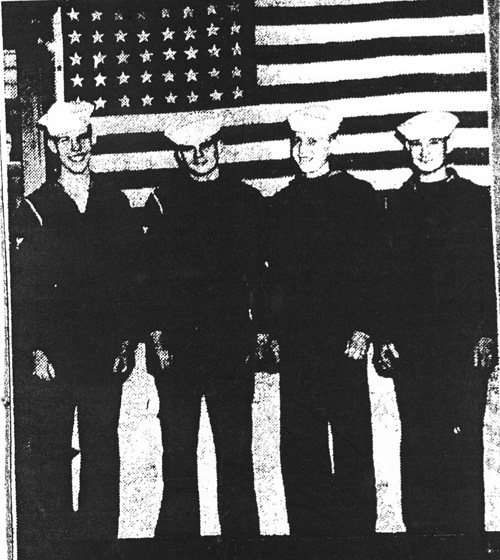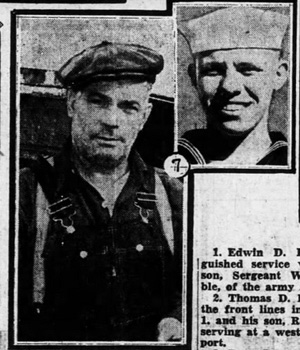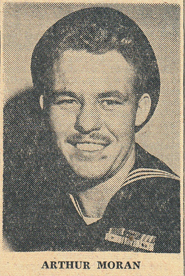
THESE NEW SAILORS will leave Sunday after spending several days at home. Enlisted in Sioux City some time ago, they have completed their recruit training and now will go to sea or to trade schools.
Left to right are: Roy Garlock, of South Sioux City, Nebraska, and James Anthony Mitchell, Kenneth Harold Cobbs, and Arthur Francis Moran, all of Sioux City, Iowa.
Source: The Sioux City Journal, November 1, 1941 (photo included)
![]()
Father and Son War Repeaters—
Veterans of World War No. 1 Have Sons in Service Now
Reporter Finds Nine Such Combinations—May Be More.
By Don Pinkston.
Like father, like son, even unto war and the defense of democracy.
Uniforms are somewhat different—smarter looking these days, the legionnaires of ’17 and ’18 admit—the army rides more, the air arm is more important and a few others things have changed. But there’s many an American father today can look at his son and know his thoughts.
Dad went through it, back in another day when the United States went to war against an aggressor in the world.
Since world war No. 1 and world war No. 2 came only a generation apart, never before in American history have so many soldiers and sailors had veteran-fathers back home.
Sioux City has its quota of those father and son patriots and undoubtedly will have more.
* * * *
[excerpt]
Two employees of the city sewer service have sons in the new war. Arthur F. Moran, 17, is in the navy, and his father, who lives as 2529 E. Second street, was overseas in the ground services of the naval air corps. He spent most of his time in Italy and France.
* * * *

7. Arthur F. Moran, overseas veteran of 1918, and his son, Arthur, jr., who also chose to serve in the navy.
Source: The Sioux City Journal, January 11, 1942 (photos included)
![]()
Sioux City Signalman Admits He Was “Plenty Scared” on D-Day
Arthur F. Moran Has Been Wounded Three Times; Decorated
By Dorcas Voight
“One thing happed on D-day that I don’t think I’ll ever forget,” said Arthur F. Moran, signalman second class, who has been spending an emergency leave at the home of his father, 2529 Second street. He was called home to see his mother who died December 31, 1944.
In telling of the D-day invasion he explained that he was on an L. C. T. in charge of a group of men in communications. When they landed with the second wave, just five minutes after the H-hour, they just stepped off the ramp when their ship was shelled and hit three times. He remarked with a grin, “I was plenty scared then.” Going in on this invasion he said 24 of the 31 men in his command were injured or killed and his division suffered 40 per cent casualties.
Nearly Four Years Service.
Seaman Moran has been in service for three and one-half years. He was in Manila when the war broke and said, “we really got out of there in a hurry.” He wears seven stars for participation in major battles which were at Java, Macassar straits, north Africa, Oran, Sicily, Salerno and Normandy. He was wounded three times and has the purple heart with two oak leaf clusters.
In describing the battle of Normandy he said, “Our group hit the toughest part of the beach when we went in. They hadn’t cleaned it off for us and besides, there was a panzer division on maneuvers when we went in. The shelling and bombing was very heavy and I slept in a tank the first night. Knocking out German defenses was a slow process as an ‘88’ was still shelling us on the third day.”
When they landed in Normandy he said the French were very unfriendly. There were snipers, both men and women, aiding the Germans. “Once the Americans had established a foothold, however,” he said, “the French became indifferent except that they boosted their prices and tried to get as much money as possible from the American troops.”
The D-day invasion was the worst of the three he participated in, Seaman Moran thought. He said it was the steadiest and lasted the longest. The others, at Sicily and Salerno, he said were sharper but there were lulls when the men could rest. When asked how he felt while taking part in an invasion he remarked, “It is terrible, you feel so helpless.”
Hears Germans Treated Well.
Concerning the feeling of the troops overseas about the people “back home” he said the only complaint he heard was that the German prisoners were too well treated, both in the United States and in some places in Europe.
Supplies went through to them pretty well but there was a time shortly after the invasion of Normandy when they didn’t have any fresh meat because it was all being given to the civilian population of France. France began rationing after D-day, he said, but up until then they had had plenty.
“Italy is badly in need of supplies,” Mr. Moran said. “When the Germans were there they took everything. The Italians were nice to the Yank troops when they arrived, nicer than the French.”
Did Sub Duty.
After being wounded at Salerno, Seaman Moran was sent to Cherbourg and put on duty on a sub chaser. That was his last station before being sent home.
Seaman Moran is a graduate of East high school and prior to entering service was employed at Armour & Co. He was a member of the Sons of American Legion drum and bugle corps for several years.
Source: The Sioux City Journal, January 23, 1945 (photo included)
![]()

